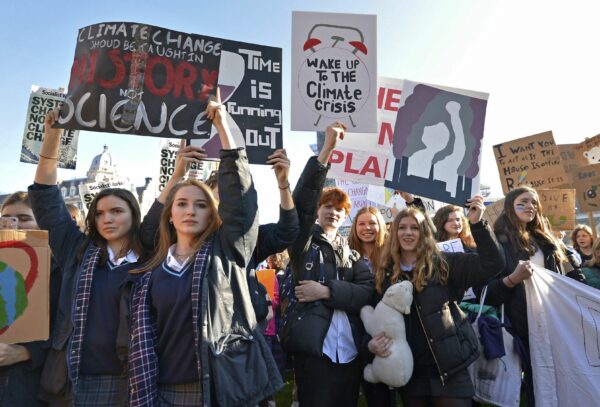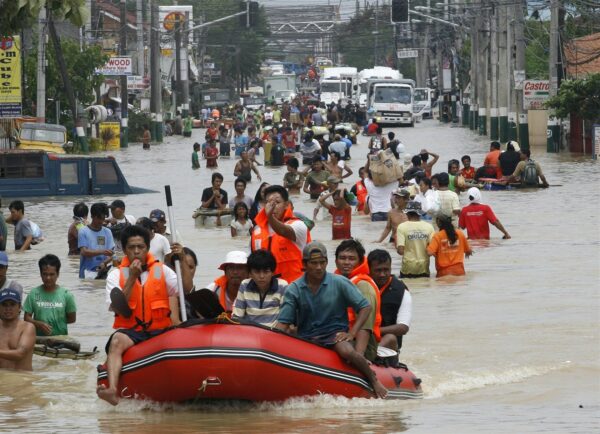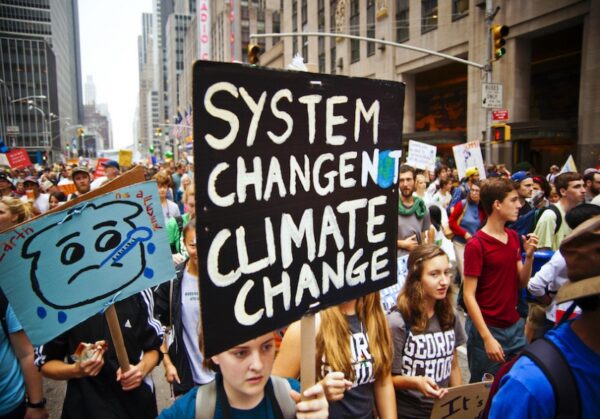Democratic socialist planning is the only solution to ecological collapse
Pasha, Socialist Action
Last August a 15-year-old Swedish student Greta Thunberg decided to stage a school strike until the day of the Swedish elections. This was to protest against politicians in Sweden and around the world neglecting the climate crisis, sacrificing the future of her own and later generations.
Last year due to climate change, Sweden experienced the hottest summer in history and saw multiple serious wildfires.
After the Swedish elections last September, Thunberg continued her strike every Friday. Her protest inspired tens of thousands of young people around the world into action, organising movements such as “School Strike for Climate” and “Fridays for Future”.
In November, Australian students were the first to stage a nation-wide school strike against climate change with over 15,000 taking part. Student strikes were also seen in at least 270 cities in countries including Australia, Austria, Belgium, Canada, Netherlands, Germany, Finland, Denmark, Japan, Switzerland, United Kingdom, United States, Columbia and Uganda. More than 100,000 students participated.
Students across the world are now planning an international action, a “Global Strike for Climate”, on 15 March. In face of the impending crisis of the whole human race, young people and students have risen up to struggle.

What about climate change?
With increasing carbon emissions caused by human activities, the global average temperature has increased by 1 degree Celsius compared to pre-industrial times. Further increases in temperature will bring dire consequences for the entire humanity.
As sea temperature rises, hurricanes and typhoons will become more frequent and severe. Last year, Hurricane Florence in North America and Typhoon Mangkhut in East Asia, which both caused widespread damage, were timely reminders of this. In October 2018, we also saw Cyclone Leslie, which devastated the Iberian Peninsula, only the second time a tropical cyclone has hit Europe since 1842, the other occurring in 2005.
Melting polar ice will lead to rising sea levels, which, in turn, lead to worsening of floods in coastal low-lying areas. Millions of people could be forced to leave their homes and become refugees. In 2018, we saw severe floods in Shandong China, northeastern India, the Philippines, southwestern France, etc.
Therefore, climate change will bring more extreme weather in every part of the world, meaning more hurricanes, floods, fires and droughts. Our already fragile eco-system will take a further hit, affecting agriculture, food production and clean water supplies. According to the UN, 65 percent of Africans will face shortages of clean water, despite Africa accounting for a small share of overall carbon emissions.
Wars and ethnic clashes may break out over control of what little resources we have left. The working class and poor will be the first to pay the price of the climate crisis.

Capitalist solutions?
The United Nations founded the Intergovernmental Panel on Climate Change (IPCC) in 1988 in an attempt to pull governments together to reduce global carbon emission.
After a series of negotiations, capitalist countries signed the Kyoto Protocol in 1997, which aimed to reduce global carbon emissions by 5.2 percent compared to the year 1990. However, the US and Canada soon withdrew from the treaty. Most other industrialised countries did not seriously implement the targets outlined in the treaty.
Moreover, with the relocation of production lines to the developing countries and the industrialisation of emerging economies such as China and India, global carbon emissions have actually skyrocketed since the start of the century. The Kyoto Protocol was a complete failure.
In 2015, 197 countries gathered in Paris, France to sign a new pact on climate control. According to the new Paris Agreement, each country will pledge its own reduction targets in order to limit the global average temperature increase to between 1.5 and 2 degrees Celsius (we are currently at +1 degrees).
But here is the problem. Firstly, the pledges are all voluntary and non-binding, so there are no teeth in the Paris Agreement to enforce even these inadequate targets. After nearly 30 years of backsliding by the major powers, it would be surprising to see the pledges really honoured. So far, only sixteen countries out of the 197 have set up a national climate action plan ambitious enough to meet their pledges.
Even if the pledges were fully honoured, the pledges are so low they will result in temperatures rising by a catastrophic 3C, far above the 1.5C to 2C limit that the IPCC is calling for.
Finally, Donald Trump has announced that the USA, the second biggest emitter of greenhouse gases (carbon dioxide and other gases that cause climate change), will pull out of the Paris Agreement in 2020. And newly elected Brazilian president Jair Bolsonaro has also threatened to do the same in order to open the Amazon rainforest to agribusiness. So, the Paris Agreement may collapse before it has even started.
Global carbon emissions reached a historic high in 2018, 2.7 percent more than in 2017. Almost all countries saw an increase in emissions: China 4.7 percent, the US 2.5 percent, India 6.3 percent. This shows that neither the Paris Agreement nor the capitalist system as a whole can solve the climate crisis.

12 years left
IPCC released a new report last November, stating that the world needed to limit global warming to 1.5C in order to avoid the worst effects of climate change. And to do that, we only have 12 years left.
Until recently it was thought that, if the increase could be restricted to 2C, as in the Paris Agreement, the worst effects of global warming could be avoided.
The report shows that at 1.5C, the share of the world’s population that would suffer from water stress would be 50 percent lower, while hundreds of millions fewer of the poorest on the planet would face poverty as a result of climate change. The half-degree difference could also prevent corals from being completely eradicated and ease pressure on the Arctic.
With a 2C increase, sea levels will rise up to 6 meters in 200 years, swallowing more than 1,150,000 square km of land (double the size of Thailand), hitting areas where more than 375 million people live today. Some of the worst hit regions would be the very populous coasts of East Asia, including megacities like Beijing, Tianjin, Shanghai, Guangzhou, Kaohsiung, Hanoi, Bangkok, Yangon and Dhaka.
The IPCC report maps out what needs to be done to restrict warming to 1.5C, it also adds that immediate radical action is needed. Total carbon dioxide (CO2) emissions will have to be cut by 45 percent by 2030, and industrial CO2 pollution by 75-90 percent by 2050.
This will require investment to be increased at least fivefold in low carbon technologies such as wind and solar power, and in energy efficiency measures like building carbon neutral homes. The deployment of renewable energy will have to increase by up to 14-fold. Massive reforestation will also need to be undertaken, since trees absorb CO2.
What are the prospects for the unprecedented changes demanded by the report? Professor Jim Skea from Imperial College London, one of its authors, said: “We show it can be done within the laws of physics and chemistry. Then the final tick box is political will.”
This ‘political will’ refers to the political system itself. Capitalist governments around the world, even those who claim to be environmentally friendly, will not be able to deliver such radical changes. The UK is now championing shale gas extraction. The German government, which has long claimed green credentials, is currently pulling down forests to dig for coal. Another ‘green champion’, Norway, is pushing ahead with oil exploration in the Arctic.
Some people may look to China, since it is now the global leader in renewable energy. China’s solar panel production was at one time double the global demand, but the profit system of capitalism led to overcapacity and that renewable energy could not profitably replace fossil fuels. It is true that there was a levelling out of emissions a few years ago, following a reduction in the rate of economic growth in China, but greenhouse gas output is now increasing again.
Paradoxically, this is also partly linked to the slowing down of China’s economy. The government is increasing the number of polluting coal-fired power stations in an attempt to stimulate the economy, while the available renewable technology is not being fully utilised.

Democratic socialism
In Greta Thunberg’s speech at the UN Climate Change Conference in Poland last December she said, “If solutions within this system are so impossible to find, then maybe we should change the system itself.”
Capitalism has conned us into fighting climate change as individuals, like switching off lights or using fewer plastic straws. Yet only 100 multinational corporations are responsible for 71 percent of carbon emissions since 1988. Governments above all represent ‘their own’ multinational corporations. This handful of huge firms compete for market share and profits against their rivals in other capitalist nation states and rely on their governments to protect their own interests, in the first place, profits.
The latest IPCC analysis is that it will cost US$900 billion per year to implement the programme it says is needed. It is inconceivable that the capitalists will voluntarily bear the cost of this and sacrifice their profits. This is the fundamental reason why any meaningful international agreement under capitalism to solve climate change has proved impossible. We must change the system.
However, US$900 billion represents less than 2 percent of world GDP. The working class by taking over political and economic power from the capitalists, can provide the “political will” that the scientists have been talking about.
Some working-class and poor people may have a sceptical attitude to these issues, correctly fearing they could be made to pay for tackling climate change, rather than the big corporations responsible for the pollution.
That is why, there is a need for a democratically organised socialist plan of production, to implement such spending without dislocating the economy or cutting across the other urgent needs of society, by taxing the rich and taking over the main economic sectors under workers’ control. Workers in dirty sectors would be transferred to employment in renewable energy and other clean sectors, with no cuts in pay or working conditions.
China is currently the world’s number one in carbon emissions, Hong Kong is also in seventh place for real carbon emissions per capita. People in our part of the world need to be part of the global struggle.
Democratic socialism, based on humanity’s needs and not profits, is the only solution to the impending crisis.




